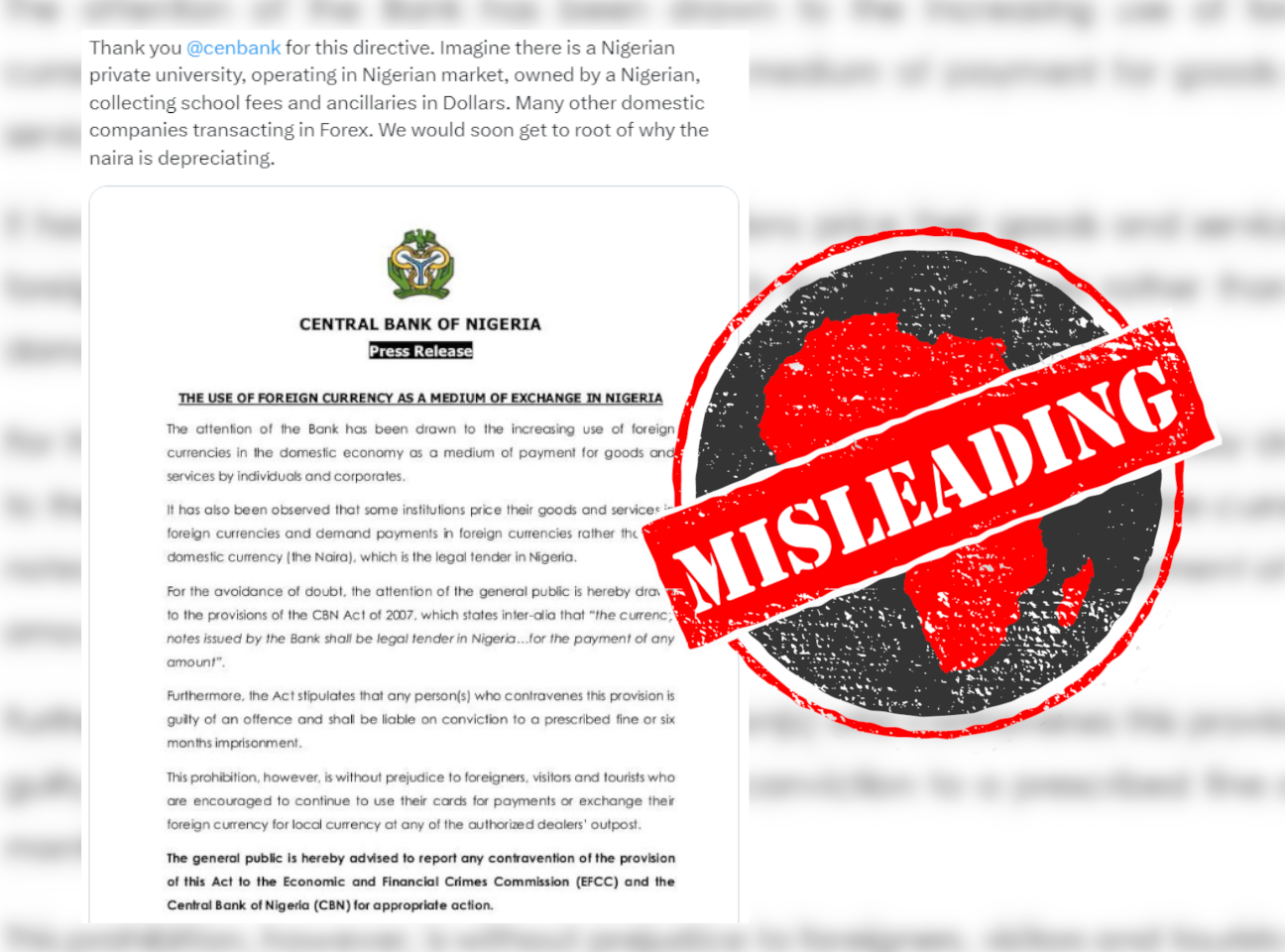IN SHORT: A press release circulating on social media in Nigeria in February 2024 is from 2015, when the country’s central bank hoped to encourage Nigerians to use the naira and not foreign currency. It is not part of more recent efforts by the new CBN governor to strengthen the naira.
A post on X (formerly Twitter) includes a press release by the Central Bank of Nigeria (CBN) and praises the bank’s effort to strengthen the country’s currency.
The post, dated 4 February 2024, reads: “Thank you @cenbank for this directive. Imagine there is a Nigerian private university, operating in Nigerian market, owned by a Nigerian, collecting school fees and ancillaries in Dollars. Many other domestic companies transacting in Forex.”
The press release reminds Nigerians about the CBN Act of 2007 which said that only naira issued by the bank was the legal tender in Nigeria. The press release then calls on those using foreign currencies to go back to the naira.
The press release also states that people who contravene the provision are guilty of an offence and “shall be liable on conviction to a prescribed fine or six months imprisonment”.
On 9 February 2024 Yemi Cardoso, the newly appointed CBN governor, and the Nigerian senate met to discuss the state of the economy and the sharp decline the naira had experienced in the previous months.
Cardoso has made various efforts to strengthen the naira. On 17 January, the apex bank of the country said it had paid around US$2 billion to settle the backlog of unpaid foreign currency liabilities in several industries, including manufacturing, aviation and petroleum.
Misinformation about CBN efforts to strengthen the naira has been rife. Africa Check recently debunked claims that $30 billion in domiciliary accounts would be converted into naira.
The press release found on X is being shared online as proof of further efforts by the CBN to boost the naira.
We found similar posts on Facebook here, here, here, here, here, here, here, here, here, here, here, here, here, here and here. Instagram posts have also posted the press release here and here.
But is this all accurate? We checked.

Old press release from 2015
Africa Check found the official press release on the CBN website, published on 4 July 2015.
The press release was signed by Ibrahim Mua’zu, at the time the director of corporate communications for the bank. But Mua’zu moved from corporate communications to strategy management in 2016 and in 2024 we would expect a press release to be signed by the new director of communications.
A press release issued by the bank on 3 February 2024 is signed by the acting director of the corporate communications department, Sidi Ali Hakama, who was appointed on 1 December 2023.
In 2015 the bank also had another governor, Godwin Emefiele, who served from 2014 to 2023 until Cardoso’s appointment. An injunction made under the previous governor can’t be attributed to Cardoso.
By fact-checking and verifying misleading information about Nigeria’s currency policy, Africa Check hopes to prevent the spread of false or misleading narratives that may cause confusion or harm.
Republish our content for free
For publishers: what to do if your post is rated false
A fact-checker has rated your Facebook or Instagram post as “false”, “altered”, “partly false” or “missing context”. This could have serious consequences. What do you do?
Click on our guide for the steps you should follow.
Publishers guideAfrica Check teams up with Facebook
Africa Check is a partner in Meta's third-party fact-checking programme to help stop the spread of false information on social media.
The content we rate as “false” will be downgraded on Facebook and Instagram. This means fewer people will see it.
You can also help identify false information on Facebook. This guide explains how.


Add new comment